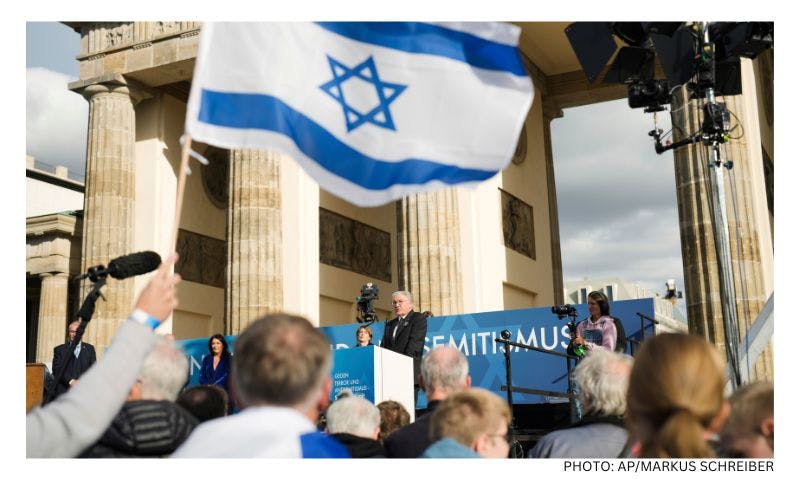Published: 12 October 2021
Last updated: 4 March 2024
PAULA TOWERS: Study into loneliness in Sydney, the first in a Jewish community anywhere, also found that more attention needs to be paid to the male population
YOUNG JEWISH PEOPLE feel much more isolated than other age groups, a pioneering study into loneliness in the Sydney Jewish community has found.
In the 18-25 years demographic, 29 per cent reported a “general sense of emptiness” and 36 per cent feeling “rejected/left out”.
In the 26-35 age demographic, 42 per cent said they felt “generally isolated”, and 50 per cent said they “miss having someone to be with’.
Launched by Combat Loneliness, which comprises a group of health professionals, the study was spearheaded by psychologist Dr Eva Lowy and assisted by 19 community organisations. This included a range of synagogues which helped publicise the survey as well as encouraged their members to participate.
It is believed to be the first of its kind, researching a Jewish community, in the world. Dr Lowy told The Jewish Independent that until now, “there wasn’t any information available regarding how extensive the issues of loneliness and isolation is in the community.
The survey was conducted over 10 weeks, from June to September, with 447 people responding. Of that total, 69 per cent - 310 people - said they experienced loneliness.
The findings on loneliness among young people is an overlooked phenomenon, according to the Council of Ageing. “The study highlights an issue that’s been unaddressed and hiding under the surface for quite a long time,” Rachel Tanny, the CEO of the Council for Ageing in Sydney told The Jewish Independent.
Because the study was done during Covid, you’re seeing younger people xperiencing the same kinds of difficulties that older people have always experienced.
“Because the study was done during Covid, you’re seeing younger people and a broader spectrum of people experiencing the same kinds of difficulties that older people have always experienced when they’ve been home-bound.”
“Now it’s a topic of conversation, regardless of people’s age and mobility; before it was really hidden.”
The study also found the group reporting feeling most loneliness was people 66 years and over - women, 48 per cent, and men, 37 per cent. But Dr Lowy said these findings were at odds with other studies into this age group that have found the cohort is not, on the whole, as lonely as young people because of their family ties and networks.
However, she said one definite takeaway from the survey is that the male population needs more attention. Only 26% of those who participated in the survey were men, and a large percentage of those over 50 (37 per cent of those over 66, and 29 per cent of 51-65) reported strong feelings of loneliness.
“I think a hidden group is men. As a result of Covid, many have lost jobs, or businesses, and they have always been the under-reported segment of our society. There needs to be something to reach out to them and to bring them into the community, into the fold, and give them something to hope for.”
The survey also looked at how strongly respondents feel connected to the Jewish community. In contrast with their feelings of loneliness, 71 per cent of the 18-25 years group said they ‘feel more comfortable at Jewish events [than other events]’, the highest response of any cohort.
And in a message to community organisers, 59 per cent of the 26-35 bracket, and 50 per cent of the 51-65 cohort, said Jewish organisations reach out – “very badly” or ‘’poorly”.
“People are not reaching out as well as they could be ... the reason probably is there aren’t many things being put on to entice people to come in; they don’t really know what to do and where to turn to,” Dr Lowy says.
“If there was an app or a social register, and they saw that although this has been a horrible week/month but next week there’s a really interesting talk/event on, and they might know some people there – little things like that make a difference, they give people hope.”
She says another factor is that declaring that you’re lonely can be stigmatising. “That’s why it has to be normalised… we have to realise that connecting with people and having connections is one of the most important things for resilience and well-being,” she adds.
“People need to hear people who have been experiencing loneliness and social isolation, they need to hear them speak. And this [study], I hope, gives a voice to people and furthermore, I think it signals there is a drift from the Jewish community; people are not as well connected, and partly that can be redressed, I think by community influencers reaching out. And be seen to be reaching out.”
Many men have lost jobs or businesses, and they have always been the under-reported segment. There needs to be something to reach out to them.
This stigma can be a roadblock, agrees Dr Sophie Lewis, Senior Lecturer in the Sydney School of Health Sciences, Faculty of Medicine and Health, University of Sydney, whose research includes how social interactions and social context enable people to manage chronic conditions.
“We also found, like in this study that stigma around disclosure that you are experiencing loneliness is significant, and can create an obstacle to help-seeking. We have found that people may not necessarily talk about themselves as lonely, but rather use other terms like ‘isolation’ or ‘disconnection’.
“One of the things that this survey highlights, also shown in our own research on people with long-term conditions, is that it is really important to think about loneliness as a shared or collective experience, not just an individual one,” Lewis says.
Dr Lowy has already received positive feedback on the study. A number of community leaders agree on how important this type of study is – and how it will probably inform their activities and programs post-Covid, into 2022.
This supports one of the key findings that the majority of those participants who had a plan to alleviate their loneliness/social isolation preferred the idea of “attending an event with 10‐30 people”.
“Covid has particularly highlighted the importance of people being able to be in touch with each other,” Jewish House CEO Rabbi Mendel Kastel concurs. “The study really highlights those who go under the radar. It’s important that we do something about it.
“[Therefore] we’re looking at a program to be able to connect people who might have similar interests or views; the main thing is that they should be able to be in touch and share some time and thoughts together. I think that’s really important and we’re working on developing the program, across different age groups and needs.”
Main image: courtesy Combat loneliness website




